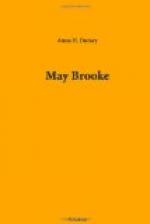“I shall not hinder you, child,” said Mr. Stillinghast, repressing a groan of anguish which struggled up from his heart. They went together into the sitting-room; and May spread his supper before him, but he only drank his tea, and pushing his plate away, came and sat in his armchair beside the fire.
“You have taken nothing, sir; pray try and eat this, it is very nice.”
“I have such an infernal singing in my ears, that I cannot eat. I can hardly see. Ding, dong—ding, dong. Great Lord! if this should be eternal!” he exclaimed, forgetting the presence of May.
“You are not well, sir. Sit here near the fire; put your feet upon this cushion, so that the soles will be towards the fire, and while you smoke, I will read the paper to you,” said May.
“For what?” he asked, turning his fierce, gray eyes upon her.
“Because you are not well, sir,” she said, looking calmly into them.
“Do you know that I have made my will,—cut you off with a few paltry dollars, not enough to feed you, and left that Helen—that trifler—that waif, a princely fortune?” he asked, savagely.
“You have a right, sir, to do as you please with your own. You have sheltered, schooled, and fed me—I have no right to expect more,” she said, gently.
“And if I should be sick—die—what then?” he asked, impatiently.
“Dear uncle, you alarm me. Do you feel ill? If so, oh, dearest uncle, attend first of all to your eternal concerns—make your peace with God while it is yet day, and enter into that fold whose Shepherd is Jesus Christ; where one Lord, one Faith, one Baptism reign!” exclaimed May, grasping his hand.
“Be silent, you incorrigible papist; what need is there of flying off at such a tangent?” said Mr. Stillinghast, with a grim smile; “I did not mean that, but what will become of you when I am dead?”
“I have a head, sir, and hands, and great faith in Him, who has promised to be a father to the orphan. I shall never want. In honest exertion I shall be happy and content,” she said, earnestly.
“And you do not regret or envy the fortune?
“Not on my own account, sir.”
“On whose, then?”
“There are many, sir, who might be benefited by it, if properly applied. I think, now, if I had a fortune, I could do a great deal of good with it.”
“You’d do harm, May Brooke—you’d do harm. You’d squander it—you’d encourage pauperism, and worthlessness, and beggary!” he burst out.
“I shall never have it to do good or evil with, uncle; but if I had, I would endeavor, for God’s sake, to bestow it where it was needed; and because it would be offered for the love of Him, my works would not fall useless or fruitless to the earth. HE would bless and aid me.”
“Profit—gain—loss,” again muttered the old man. “But, as you will never inherit a fortune, I suppose your good intentions must suffice.”




